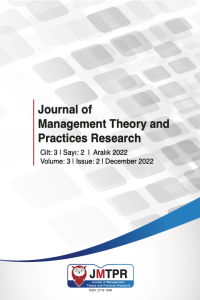TEK EBEVEYNLE YAŞAMANIN ÇOCUK VE ERGENLERE ETKİLERİNİN İNCELENMESİ
Bu çalışmanın amacı, tek ebeveynle yaşamanın çocuk ve ergenlere etkilerini incelemektir. Çalışma literatür taramasıyla yapılmıştır. Tek ebeveynlik, çocuk ve ergen üzerinde önemli etkiler yapmaktadır. Gelecek kuşakların sosyal, ekonomik, kültürel, iletişimsel, bilimsel- teknolojik değişimlere uyum sağlayabilmesi ve küresel ısınma, iklim değişiklikleri, şehirleşme, nüfus yoğunluğu, göç gibi sorunlara çözüm bulabilmesi için sağlıklı bireyler olarak yetişmeleri ve psikolojik dayanıklılığa sahip olmaları önemlidir. Bu bağlamda tek ebeveynle yaşayan çocuk ve ergenlerin incelenmesi ihtiyacı doğmuştur. Boşanma, ayrı yaşama, terk edilme, farklı bir şehir ya da ülkede çalışma nedeniyle uzun süren ayrılıklar, ölüm gibi nedenlerle çocuklar tek ebeveynle birlikte yaşamak durumunda bırakılmaktadır. Genç yaşta evlilik, düşük eğitim düzeyi, ebeveynin boşanmış olması, evlilik öncesi bebek sahibi olmak, iletişimsizlik, sosyal, ekonomik ve kültürel farklılıklar boşanmada artışa yol açan faktörlerdendir. Boşanma sadece anne-babaları değil çocukları ve ailenin diğer bireylerini de etkilemektedir. Boşanmanın etkisi çocuğun yaşına, gelişim özelliklerine, anne- babası ve yakınlarıyla olan ilişkisine göre farklılaşmaktadır. Okul öncesi çocuklarda regresyon (parmak emme, yatağı ıslatma, anne-babaya vurma, sevilen bir oyuncağa ya da nesneye bağlanma, yapışma), emosyonel gereksinimlerde artma, bağımlılık, agresyon, korku, kaygı, üzüntü, öfke ve uyku sorunları… gözlenebilmektedir. Okul çağında ise öfke patlamaları, karşı gelme, suç işleme, okul başarısızlığı ve okuldan kaçma gibi problemler ortaya çıkabilmektedir. Anne babası boşanmış 155 ergenle yapılan bir araştırmada, boşanmış (x=21,589), geçimsiz (x=27,13) ve geçimli (x=20, 95) ailede yaşayan ergenlerin benlik değeri puanları arasında istatistiksel olarak anlamlı (p<0.01) farklılıklar olduğu (F (4,425) = 13.679, p = .000) saptanmıştır. Boşanmış ve geçimsiz ailede yetişen ergenlerin, geçimli ailelerin çocuklarına göre benlik değeri daha düşüktür. Geçimsiz ailede yaşamak, boşanmış aileye göre çocukların benlik değerini daha çok olumsuz yönde etkilemektedir. Geçimli aile çocuklarının benlik saygısı, insanlara güvenme, ana baba ilgisi puanları, diğerlerinden daha yüksek; depresif duygulanım ve psişik izolasyon puanları daha düşüktür (p<0.5). Tek ebeveynle yaşayan 309 ergenin sosyal beceri puanlarının karşılaştırıldığı bir araştırmada; sinemaya gidenlerin (293,61), gitmeyenlerden (279,28; t(307) =4,53, p = .000 ), tiyatroya gidenlerin (x= 303,58), gitmeyenlerden (x=285,00; t(307) =4,57, p = .000 ), konsere gidenlerin (x=299,20), gitmeyenlerden (x=285,02; t(307) =3,82, p = .000 ), kafeteryaya gidenlerin (x=296,00), gitmeyenlerden (x=281,71; t(307) =4,64, p = .000 ) sosyal beceri puanları daha yüksektir. Bilgisayarda oyun oynayanların (x=284,04), oynamayanlara (x=291,71) göre (t(307) = -2,43, p = .01 ) sosyal beceri puanları daha düşüktür. Aralarındaki farklılık istatistiksel olarak anlamlıdır (p<.01). Bu verilere göre tek ebeveynle yaşamanın etkileri, psikolojik danışma ve aile danışmanlığı açısından tartışılmış ve bazı öneriler sunulmuştur.
THE INVESTIGATION OF THE EFFECTS OF LIVING WITH A SINGLE PARENT ON CHILDREN AND ADOLESCENTS
The aim of this study was to examine the effects of living with a single parent on children and adolescents. In the study, the literature review method was used. Single parenting has significant effects on children and adolescents. It is important for future generations to grow up as healthy individuals and have psychocial resilience so that they can adapt to social, economic, cultural and communicative, scientific and technological changes and find solutions to problems such as global warming climate changes, urbanization and population density and migrations. In this context, the need to examine children and adolescents living with a single parent arose. Children are left to live with a single parent for reasons such as divorce, living apart, abandonment, prolonged separations due to working in a different city or country and death. Young age marriage, low education level, divorced parents, having a baby before marriage, miscommunication, social, economic and cultural differences are among the factors that lead to an increase in divorce. Divorce affects not only parents, but also children and other members of the family. The effects of divorce differs depending on the child's age, developmental characteristics, relationship with child’s parents and relatives. At pre-school children; regression (thumb sucking, bed wetting, parents and pounding, connecting to a favorite toy or object, clinging), increase in emotional needs, dependency, aggression, fear, anxiety, sadness, anger, sleep problems, as can be observed. At school age, problems such as outbursts of anger, defiance, committing crimes, school failure and truancy may occur. In a study conducted with 155 adolescents whose parents were divorced, it was found that there were statistically significant (p<0.01) differences (F (4,425) = 13.679, p = .000) between the self-worth scores of the divorced (x=21,589), non-subsistence (x=27,13) and living in subsistence family (x=20, 95). Adolescents who are divorced and raised in non-subsistence families have lower self-esteem than the children of subsistence families. Living in an non-subsistence family negatively affects the self-worth of children more than a divorced family. The self-esteem, trust in people, parental interest scores of the children of the subsistence family are higher, depressive affect and psychic isolation scores are lower (p<0.5). In a study in which the social skill scores of 309 adolescents living with single parents were compared: It has been found that social skill scores of the adolescents who go to the cinema (293.61), are higher than those who don’t (279.28; t(307) =4.53, p = .000 ), who go to the theater (x= 303,58), are higher than those who don’t (x=285,00; t(307) =4,57, p = .000 ), who go to the concert (x=299,20), are higher than those who don’t (x=285,02; t(307) =3,82, p = .000 ), who go to the cafeteria (x=296,00), are higher than those who don’t (x=281,71; t(307) =4,64, p = .000 ). Social skill scores of the adolescents who play computer games (x=284,04), are lower compared to those who do not play (x=291,71) (t(307) = -2,43, p = .01 ). The difference between them is statistically significant (p<. .01). According to these data, the effects of living with a single parent has been discussed in terms of psychological and family counseling and some suggestions have been presented.
